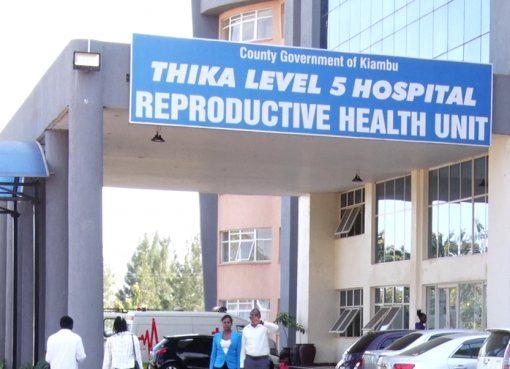Researchers and medical experts have teamed up to develop a policy brief on the viability and the safety concerns of Genetically Modified Organism (GMO) in the wake widespread misconception about the new technology.
Medics from both the Kenya Medical Association (KMA) and the Kenya Medical Practitioners Dentists Union (KMPDU) are working with the Kenya University Biotechnology Consortium ( KUBIKO) on the policy paper to demystify the myths and clear controversies shrouding the concept of GMO foods.
Speaking during a consultative meeting that brought representatives of the three bodies, the KMA CEO Dr. Brenda Obondo said it was the beginning of a journey to separate the facts from fiction and come up with a clear insights of the GMO debate.
She assured Kenyans that their concerns about the intended introduction of GMO foods in the country will be addressed in the policy document expected to be concluded in the next two months before it is made public and shared with relevant authorities.
The move comes after President William Ruto in October 2022, lifted the ban on the cultivation and importation of genetically modified crops that had been in place for over 10 years amid the worst drought in 40 years and soaring food prices.
However the executive order sparked mixed reactions with those opposed to the lifting of the ban citing health and safety issues and even seeking legal redress to stop the process which was to begin this month of February.
“This meeting was prompted by the controversy surrounding the introduction of GMOs but the medical practitioners have not had the opportunity to interrogate to make a sound policy statement from a point of knowledge “she said.
Dr. Obondo said the tripartite team resolved for the round table talks to ventilate on various health concerns raised around GMOs and possibly allays the fears of Kenyans before drafting a policy statement for public information based on research and evidence that is currently available.
Dr. Davji Bhimji Atella KMPDU National Secretary General said the union believes in science which is based on facts and evidence rather than hearsays and assumptions some of which were made for political expediency.
“Health care is fundamental. We therefore want to come up with a strong stand on GMOs once we understand every aspect scientifically and factually, he said.
Dr. Atella noted that food security , starvation , drought and suffering of every person in the country is very pertinent and blamed some of the political leaders who have been speaking on the issues spurring negative reactions from the public
“We have come in as health practitioners in order to understand. We cannot speak on the issue of the GMO from the point of ignorance and today’s meeting that we are discussing with the scientists will be fundamental to every question that any Kenyan seeking health care and wants to be reassured by the doctor”, he added
Dr. Atella gave an example of the COVID 19 vaccine that needed all Kenyans to understand and be educated on before they embrace it.
Head of Agricultural Biotechnology at the University of Nairobi Dr. Joel Ochieng acknowledged that information on GMO was still lacking among the experts in other fields and also the public.
“Majority of people think GMO is about importing the technology from outside and that is why they are resistant but as scientists we want to assure them that we have home grown solutions and that research has been undertaken locally on developing products such as the BT maize.
Dr. Ochieng who is also the KUBIKOs Secretary General explained that if it wasn’t for the court cases that are still pending and not yet heard, the BT maize that has been developed is supposed to have gone to the farmers for cultivation
“The court process is on and we respect that. We are hoping that we will be vindicated because the scientific evidence available has shown that there is no single safety concern about BT products or crops. There are only a few concerns being raised in social dimensions such as farm rights which have been adequately addressed by safety Acts,” he said.
According to Dr. Ochieng the BT Maize product not only improves and restores the yield but it also improves food safety because once the stem borer pests that affect maize is controlled, it helps in blocking the entry point for the fungus that causes aflatoxin.
The Country is struggling as we have a production level of maize standing at 2.8 million metric tons against consumption of 4 million metric tons and therefore the deficit of 1.2 million metric tons which we import, he explained.
“Hopefully once the BT goes to the farmers, production level will go up as it will restore yield and since we are taking the issue as temporary, once GMO is allowed to be deploy in farms we are sure part of that food security will be improved”, he noted,
Dr. Ochieng said the policy paper is meant to guide the public and the government on the direction they should take or systems they should put in place.
Dr. Stella Bosire from KMA said that public concern is a big issue for health care practitioners.” We take care of the public so we must be able to ensure that there are no co-relations or there is nothing that is likely to increase the risk of patients when it comes to GMO”.
She acknowledged that the concerns expressed by Kenyans on GMOs are legit and that Doctors have heard them and thus the data that is available will guide them in the policy statement that will also have recommendations.
“Our work is bound by an oath of doing no harm. We will ensure that decisions are made based on the right information and facts, and find out if there is any risk that will come out,” Dr. Bosire said.
Prof Richard Oduor from Kenyatta University and Council Member of KUBICO assured Kenyans that for the last 18 years , research on GM has been carried out by Governments critical institutions and therefore the public should know that they would not be harmed in any way.
“Data is here. Come and ask queries and if there is any concern that will require more research, we will be available to do it. I call upon the government to hasten steps and now figure out how courts can hasten the process and lift the ban so that we can enjoy GMO foods the way we are enjoying the GM drugs,” Prof. Oduor said.
GMO crops have been used world over and among the countries that have been producing GM crops the USA, Brazil, Argentina, India and Canada as also the largest users. In Africa currently; South Africa, Burkina Faso, Egypt and Sudan are also growing GM foods.
By Wangari Ndirangu





